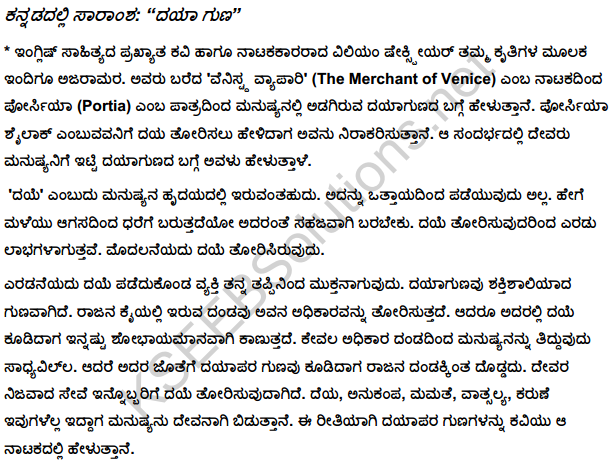10th English Quality of Mercy Poem Summary in English and Kannada
Quality of Mercy Poem Summary in English
“The Quality of Mercy ” is a famous speech by Portia, in disguise as a young lawyer, in Shakespeare’s play “The Merchant of Venice”. She pleads for mercy from the Jewish money lender, Shylock, who holds all of Antonio’s loans and demands a pound of flesh for the default. She hopes to persuade Shylock to accept twice the amount of the loan in lieu of the contracted fee of flesh. Now we can analyse Portia’s speech with regards to the essential differences between mercy and justice in the play.
![]()
Mercy is natural. Portia says that the quality of mercy is not strained, it is. not forced effort but something that one already possesses. Mercy cannot be forced by anyone. It is something that one must come up within himself. Like how “gentle rain” can not be created artificially. It is sincere.
Mercy also benefits the merciful. Portia says that “earth power doth then show likest God’s when mercy seasons justice” implying that man can only become like God when he is merciful. Mercy is something powerful. Scepter show the force of temporal power but mercy is above this sceptered sway. It symbolises that mercy is more powerful than mere symbols of earthly power that is the crown and scepter.
Mercy is forgiving. Portia points out that God is merciful and forgives us for our sins and “in the course of justice none of us should see salvation” only with the mercy of God would they be delivered. Mercy is reciprocal and “twice blest” bringing good things to both “him that gives and him that takes”. Mercy is divine as it droppeth from heaven and an attribute to God himself. It is a heavenly quality, a sacred virtue and he who has this characteristic becomes “likest God”. It is like gentle rain from heaven. She tells Shylock that what he should strive for is not justice but rather mercy.
![]()
Quality of Mercy Poem Summary in Kannada

![]()
Quality of Mercy Poem About the Author
William Shakespeare was born on April 23, 1564, in Stratford-on- Avon. He was regarded as the foremost dramatist of his time. His sonnets were composed between 1593 and 1601.

The Sonnets of Shakespeare, consists of 154 sonnets, all written in the form of three quatrains and a couplet that is now recognized as Shakespearean. The sonnets fall into two groups: sonnets 1-126, addressed to a beloved friend, a handsome and noble young man, and sonnets 127-152, to a malignant but fascinating “Dark Lady,” whom the poet loves in spite of himself. Nearly all of Shakespeare’s sonnets examine the inevitable decay of time, and the immortalization of beauty and love in poetry.
In his poems and plays, Shakespeare invented thousands of words. His impressive expansion of the English language, according to the Oxford English Dictionary, includes such words as: birthplace, bloodsucking, courtship, dewdrop, downstairs, radiance, schoolboy, stillborn, watchdog etc.
Shakespeare wrote more than 30 plays. These are usually divided into four categories: histories, comedies, tragedies, and romances. His earliest plays were primarily comedies and histories such as Henry VI and The Comedy of Errors, but in 1596, Shakespeare wrote Romeo and Juliet, his second tragedy, and over the next dozen years he would return to the form, writing the plays for which he is now best known: Julius Caesar, Hamlet, Othello, King Lear, Macbeth, and Antony and Cleopatra. In his final years, Shakespeare turned to the romantic with Cymbeline, A Winter’s Tale, and The Tempest
![]()
Quality of Mercy Poem Word Meanings
- strain’d : forced, compelled
- droppeth: drops
- blest: blessed
- sceptre : a decorated rod carried by a king or
- a queen as a symbol of power
- temporal : worldly power
- attitude : view point
- majesty : royal power
- doth : does
- dread: threat
- enthroned : seated
- attribute : quality, character
- likest God’s : like that of God
- seasons : tempers
- ennobles: makes something noble